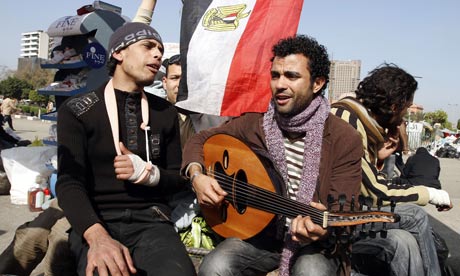
Michael Gove's new curriculum will see five-year-olds reciting poems by heart as part of the return to "traditional values". How that will pan out in real terms remains to be seen, but the power of the spoken and sung word is undeniably a fascinating subject.
Amnesty International's The Power of Our Voices is a cross-curricular set of resources designed for English, music, citizenship and PSHE lessons targeted at 11- to 16-year-olds.
Students can explore protest music through the ages in lesson one and a fascinating set of case studies ranging from suffragette Ethel Smyth, who conducted fellow prisoners singing her song March of the Women with her toothbrush, hanging out of her cell window, to protest songs in Tahrir Square during the Egyptian revolution, back to the haunting lyrics of Strange Fruit in 1930s America (the song was based on a poem, Bitter Fruit, written by Abel Meeropol, a Jewish school teacher from New York, in protest at racist murders of Thomas Shipp and Abram Smith).
Lesson two, personal stories and protest songs, focuses on Emmanuel Jal's moving poem War Child as an example of a contemporary protest song: "I'm a war child/I believe I've survived for a reason/to tell my story to touch lives." Jal is a former child soldier from Sudan.
Guided by the poet and rapper Kate Tempest, students learn how to write their own protest lyrics in lesson three – and find out about Amnesty's national protest song competition. Teachers can order the entire interactive The Power of our Voices pack for free from Amnesty International.
Martin Powell's stirring poetry provides a real wake-up call for students, who are likely to respond to his accessible, in-your-face lyrics. Write for Human Rights gets straight to the point (see Martin performing the poem here) and the simplicity of Affirmations has the power to move mountains. His poetic quotes will add fuel to the fire of any student protest or demonstration. You can find all Martin Powell's poems on the Guardian Teacher Network here.
Why is it so important to read or perform a poem out loud? Seamus Heaney said: "... every time you read a poem aloud to yourself in the presence of others, you are reading it into yourself and them. Voice helps to carry words farther and deeper than the eye". In Josephine Hart's Poetry Hour, created with the British Library, well-known figures perform readings of poetry by some of Britain and America's most distinguished poets. The detailed teachers' notes that go with the poetry performances are packed with inspiring lesson ideas. Percy Shelley's Mask of Anarchy is particularly pertinent as it is a response to the Peterloo massacre in which a number of unarmed protesters were killed and more than 500 injured. Students are asked to create political collage poems to free up their use of language and create more interesting texture to their poems. Also hear performances of the poems and find teaching ideas for Robert Browning, Emily Dickinson, Sylvia Plath, Christina Rossetti and WB Yeats (gloriously performed by Bob Geldof).
Apples and snakes work to bring a diverse range of poets directly into schools and the wider community. Their Poets in Education scheme offers inspiring poetry performance workshops and residences. Poetry lessons made easy is a series of lesson plans for use in primary and secondary schools. My Shiny Shoes looks at truth and lies through the poetry of Margot Henderson. Raman Mundair's poem An Elegy for Two Boys and related teaching ideas explores bullying and racism in response to the murders of Stephen Lawrence and Ricky Reel. John Berkavitch's A Short List of the People I Hate explores list poetry and writing poems for performance. You can see all the Apples and Snakes poetry lessons made easy here.
Sing Up has some great resources to help bring singing and music into your classroom. How to lead a singing session from Sing up gives ten lively tips with additional guidance for planning a session with SEN or older KS2 children. If your "supply bag" needs filling see Supply teachers' tips for the Olympic Games. Teachers are often affected by vocal health problems, this guide explains how and why with tips for care. And if you need some inspiration for a summer concert check out How to teach La Bamba. To find out more about what Sing Up do check out the impact on Culloden Primary School.
The Guardian Teacher Network has more than 100,000 pages of lesson plans and interactive materials. To see and share for yourself go to teachers.theguardian.com. There are also thousands of teaching, leadership and support jobs on the site: visit schoolsjobs.theguardian.com.

